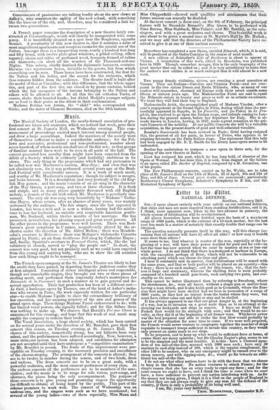lettr in tht-
NATIONAL DEFENCE.
Southsea, January 24th. Sm—I agree almost entirely with your article on our national defences, that ships and men are more required than standing fortifications, and it is, I think, more apparent now, when by the late advance in gunnery, the whole system of fortification will be revolutionized. All places heretofore have been fortified upon the basis of a maximum range of 4500 yards, which is the extreme of a 13-inch mortar, but the last year has made it a matter of notoriety that exactly double that range can be obtained.
The question naturally presents itself in this way, will this change (as- suming that all nations will have it) affect all alike ? or how may it benefit some more than others ?
It seems to me, that whoever is master of the seas, especially, at the be- ginning of a war, will have their power doubled for good and for evil—in fact the time has now arrived when we must be masters at sea or lose our whole power. I do not think that there is a dockyard or harbour in Europe, with the exception perhaps of Brest, which will not be vulnerable to an attacking party which can choose its time and place. I hear it constantly said in answer, that fortifications will be armed with the same guns, and that so both parties will be placed on an equality—this I deny ; there is no such analogy, and for this reason, viz., that the fort- ress is large and stationary, whereas the shelling force is most probably composed of a hundred small gun-boats, each carrying two guns, and con- stantly on the move.
This cannot be better illustrated than by referring to Sweaborg, where the storehouses, &O., were all burnt, without a single gun or mortar-boat having a man struck, and it also holds good as to Cronstadt, where the Rus- sian fleet might have been shelled had we been in possession of a range of 9000 yards, as they had no retreat from the basins where they were, but must have either come out and fight or stay and be shelled.
It has always appeared to me that our great danger is, at the beginning of a war, less as to invasion on a great scale than as to an attempt at de- stroying our dockyards and ships in reserve. I have no doubt that the French fleet would try its strength with ours ; and that would be no no- velty, as they did it at the beginning of all former wars. Whichever power was the best prepared and able to strike the first blow would probably be master of the situation for some time to come. If we were well prepared, the French would never venture to congregate together the number of ships requisite to transport troops sufficient to invade this country, as they would only present an easier mark to our ships.
To be prepared, and to keep up what would be sufficient force at home, of course there are many opinions ; but Sir Charles Napier's plan seems to me to be the simplest and the most feasible. It is this : have a Channel squa- dron of ten sail-of-the-line, manned with 1000 men each ; have only 50 marines in each ship-instead of 200, which is the regular complement, the other 150 to be seamen, who on any emergency might be turned over to the steam reserve, and with rigging-men, &c., would go far towards an addi- tional ten sail-of-the-line.
I do not see what other nations have to do with the force that we choose to keep in the Chsnnel. No nation ventures to attack France; for the simple reason that she has an army ready to repel any force ; and for the same reason we ought to have, and I think the time is come when we must have, a force sufficient to prevent any nation interfering with us. As for the money not being given, I think it is a libel on the people of England to say that they are not always ready to give any sum for the defence of the country, if there is only a probability of its being well used. I am, Sir, yours very faithfully,
THOS. HODOIONSON, Commander R.N.


























 Previous page
Previous page